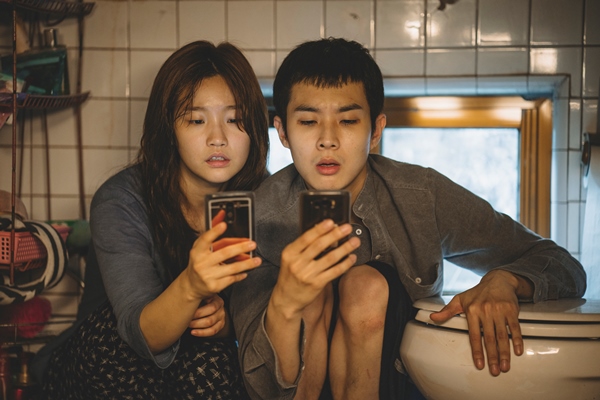

The Kims live in a basement apartment in an unnamed South Korean city. The window of their living room looks out onto the street from the ground level, where they are likely to see people pissing against the wall, breaking out in fights, or spraying insecticide in billowing white clouds. They have fallen on hard times and are scrambling to see where in their disheveled home they can pickup a Wi-Fi signal, and where they could possibly find jobs. They try their best to look on the bright side and have no qualms as to what depths they will descend to obtain a higher standard of living.
Parasite, the latest film of Bong Joon-Ho (Snowpiercer and Okja), begins as a rather broad satire, transforms into a nightmare, and by the end has assumed tragic and horrifying proportions. It is a brutal film about class, in which both the upper echelon and the stragglers below are equally naïve — the working class are viciously competitive, though, having no compassion for one another. It incorporates several classic fairy tale patterns only to explode them with events and images that destroy our faith in the familiarity of such plot structures. It is also full of dark humor, surreal twists, and genuinely jaw-dropping sequences.
It is also worth noting that the film arrives to the States with superlatives in its wake. Having won the Palme d’Or at Cannes, a casual Google search will yield review titles that say, in so many words, “Parasite is the year’s best film!” Publicity like this can be both good and bad. Certainly, there is a risk that viewers will walk in, as many did for Roma last year, wondering if the film is indeed worth the hype, and their experience of it will be tarnished as they try to decide whether it meets their expectations.
Perhaps it goes without saying that audience members should walk in with an open mind, and one trusts Bong’s film to hold up against whatever expectations, or lack of them, viewers bring to the movie theater. It is the work of a director whose rigor and curiosity have not dimmed over the years, nor has his abiding concern for who we are and where we’re going. Impeccably acted, alternately hilarious and chilling, the movie is courageous in its insistent examination of the ugliness of societal structures and the behaviors they encourage. To say more would be to risk ruining the film. So see it.






Leave A Comment